Essential Study Habits for Academic Success | Tips to Study Well
By Prapoorna M
Last Updated: November 26, 2021
Embarking on an academic journey, whether it’s transitioning from high school to college or simply striving to excel in your studies, calls for more than just a sharp mind and a stack of textbooks. The cornerstone of academic success lies in developing effective study habits. This journey, often filled with new challenges and learning curves, underscores the importance of adaptability and strategic planning in your study approach.

For many students, the shift from high school to college-level studies presents a unique set of challenges. The increased workload, a greater demand for self-discipline, and the need to balance various aspects of life and studies can be overwhelming. It’s not just about learning new material; it’s about learning how to learn effectively. This is where the power of good study habits comes into play.
The objective of this article is straightforward – to arm you with practical and easy-to-implement strategies that can transform your study routine. These aren’t just theoretical concepts; they’re tried and tested methods that can lead to real, tangible improvements in your academic performance. We’ll dive into understanding what effective study habits look like, why they’re crucial, and how you can tailor them to fit your unique learning style.
Understanding Effective Study Habits
Why do good study habits matter? The answer lies in the fact that our brains are not just repositories of information; they are like muscles that need the right kind of exercise to grow stronger. Effective study habits are akin to a well-rounded workout for your brain, ensuring that the effort you put into studying translates into actual learning and retention.
Developing good study habits is more than just a routine; it’s about creating a system that works for you. It involves organizing your time, setting realistic goals, and employing techniques that enhance your understanding and retention of the material. These habits are crucial not only for passing exams but for truly comprehending and applying what you’ve learned in real-world scenarios.
An integral part of developing these habits is recognizing and embracing your unique learning style. Are you a visual learner who benefits from diagrams and charts? Do you learn best through listening, making audio recordings your go-to tool? Or perhaps, you’re a kinesthetic learner who grasps concepts better through hands-on activities. Understanding your learning style is the key to customizing your study approach, making it more effective and less of a chore. By aligning your study habits with how you learn best, you’re setting yourself up for success, not just in school, but in any learning endeavor you undertake.
In the following sections, we’ll explore these concepts in detail, providing you with a roadmap to develop study habits that will serve you well throughout your academic career and beyond. Let’s embark on this journey together, turning challenges into opportunities for growth and learning.
Creating a Study Plan
Creating a study plan isn’t just about filling your calendar with study sessions; it’s about strategically organizing your time to make the most of your studying. The key here is to plan ahead. Just as a builder wouldn’t start construction without a blueprint, a student shouldn’t dive into their studies without a plan. This approach allows you to allocate time for each subject or topic, ensuring that nothing is left until the last minute and reducing the stress of cramming.
Here are some tips for setting up a study schedule that’s both realistic and effective:
- Assess Your Workload: Begin by understanding what you need to cover. Break down your syllabus into manageable chunks, and assign time to each.
- Set Achievable Goals: Your study goals should be SMART – Specific, Measurable, Achievable, Relevant, and Time-bound. Instead of a vague goal like “study more,” aim for something specific like “spend an hour every evening reviewing biology notes.”
- Be Realistic: Consider your other commitments – family time, extracurricular activities, rest, and leisure. A plan that doesn’t accommodate these isn’t sustainable.
- Regular Reviews: Include time for weekly reviews in your plan. This ensures that you’re not just moving on from topics, but also retaining what you’ve studied.
- Adapt and Adjust: Your study plan isn’t set in stone. Be flexible and willing to adjust it if you find certain subjects require more time than you initially thought.
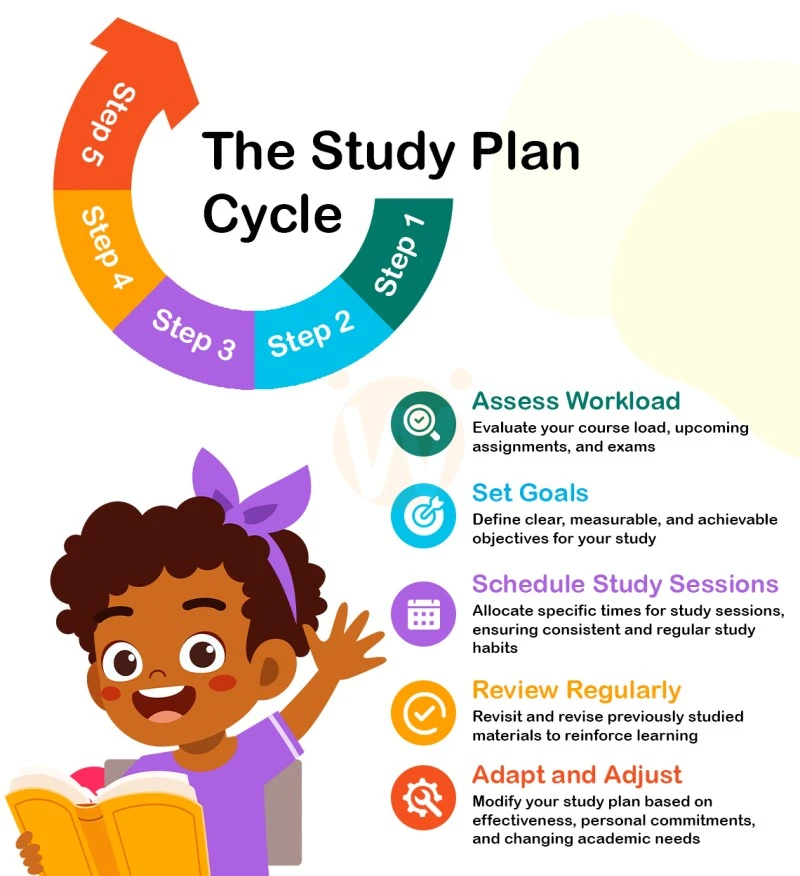
Balancing study with other life commitments is crucial. All work and no play can lead to burnout. Ensure your plan has room for social activities, hobbies, and relaxation. This balance is essential for maintaining your mental and physical health, ultimately contributing to more effective study sessions.
Choosing the Right Study Environment
The environment where you study can significantly impact the quality of your study sessions. A well-chosen study space can help in minimizing distractions and maximizing focus and retention.
- Distraction-Free Zone: Choose a place where interruptions are minimal. This might mean a quiet room at home, a corner of your local library, or even a peaceful park.
- Comfort Matters: Ensure your study space is comfortable. A good chair, adequate lighting, and a tidy, organized space can make a big difference.
- Resource Availability: Choose a location where you have easy access to all the study materials you need. This might include a strong internet connection, power outlets for your devices, and access to reference materials.
- Variety Can Help: Sometimes, changing your environment can refresh your mind. Alternating between different locations like a coffee shop and your study room at home can provide a new perspective and keep boredom at bay.
- Personalize Your Space: Make your study area inviting. A plant, a motivational poster, or a photo of your goal (like a university logo or a dream job) can inspire you.
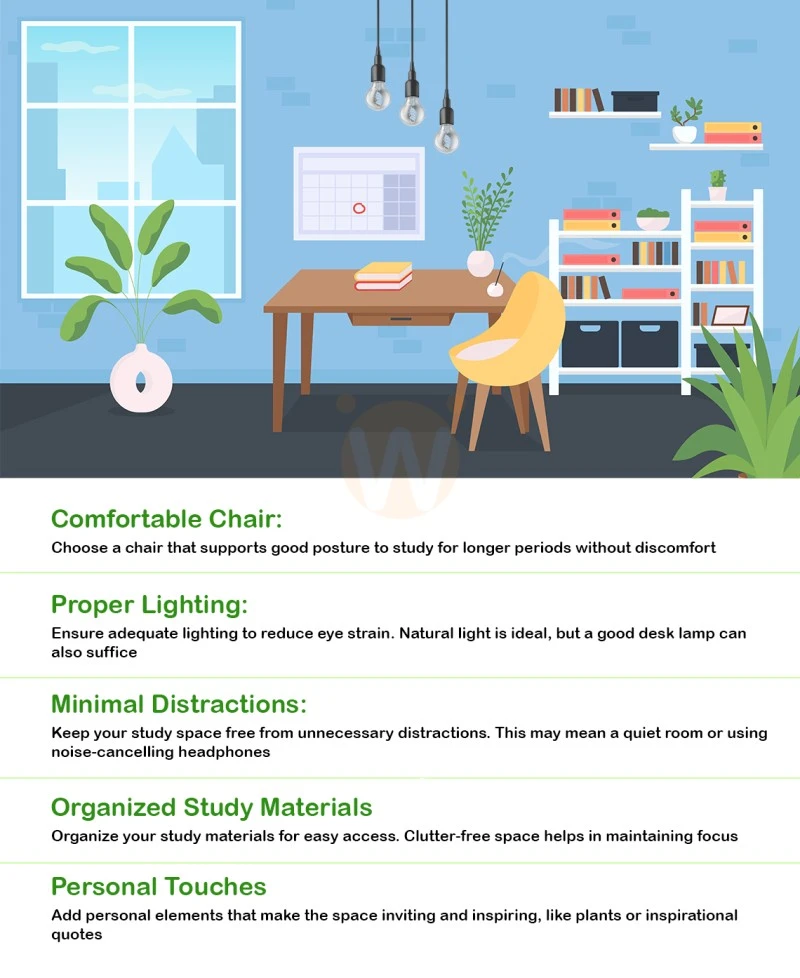
Remember, what works for one person might not work for another. Some students need absolute silence, while others thrive with a bit of background noise. Experiment with different environments to find what helps you focus best. The right environment acts as a catalyst for effective learning, helping you absorb and retain information more efficiently.
Understanding how different environments affect our mood and productivity can also be applied to sleep habits. Discover more on the art of sleeping well.
Study Techniques and Tools
Diving into the realm of study techniques, it’s essential to understand that there’s no one-size-fits-all approach. The key is to find methods that resonate with your learning style and keep you engaged. Here’s a look at some effective techniques:
- Flashcards: These are perfect for memorizing facts, dates, vocabulary, and formulas. The process of writing them out is itself a great study aid, and reviewing them regularly can reinforce your memory.
- Mind Maps: These help in visualizing connections between concepts, making them ideal for subjects that involve understanding complex relationships. They are particularly useful for visual learners.
- Summarizing in Your Own Words: This technique forces you to process the information and express it in a manner that makes sense to you. It can significantly enhance understanding and retention.
- Technology and Online Resources: The digital age brings a plethora of tools at your fingertips. Educational apps, online courses, interactive games, and virtual flashcards can complement traditional study methods. Websites like Khan Academy, Coursera, or YouTube educational channels can offer explanations that might be more in line with your learning style.
- Active vs. Passive Learning: Active learning involves engaging with the material through problem-solving, discussion, or teaching others, rather than just passively reading or listening. This approach is more effective because it involves higher levels of cognitive processing.
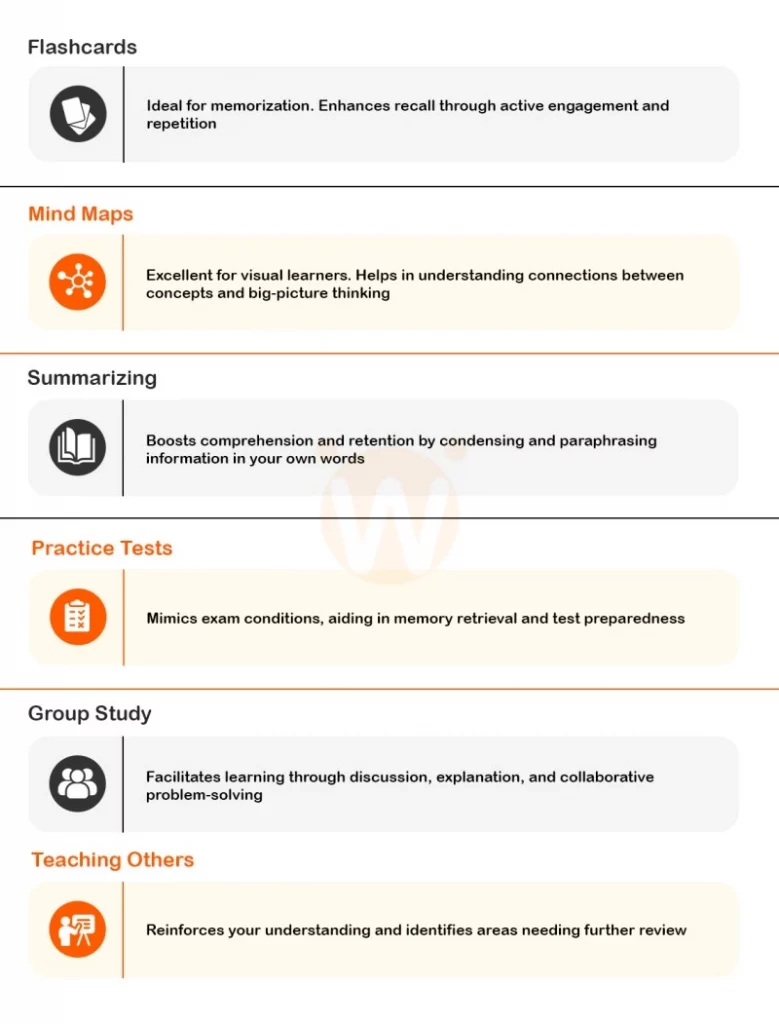
Remember, experimenting with different techniques is vital to find what works best for you. Mix and match these methods to keep your study sessions dynamic and effective.
For those looking to improve their memory and concentration in studies, additional techniques can be found here.
The Power of Group Study and Peer Support
Group study can transform the sometimes-monotonous act of studying into an interactive and collaborative experience. Here’s how you can leverage the power of group study:
- Collaborative Learning: Studying with peers can clarify doubts and expose you to different perspectives and techniques. Explaining concepts to others is also a fantastic way to reinforce your own understanding.
- Forming Effective Study Groups: When forming a study group, choose members who are serious about their studies and whose study habits align with yours. Keep the group size manageable – typically three to five members is ideal.
- Role of Accountability: Group study sessions can help in maintaining a regular study schedule. Committing to meet at specific times encourages consistency and can keep procrastination at bay.
- What to Avoid: Beware of groups where socializing takes precedence over studying. It’s essential to stay focused on the goal of the group.
- Using Technology: In today’s digital age, if meeting in person is not feasible, virtual study groups via video conferencing tools like Zoom or Google Meet can be equally effective.
- Diversity of Thought: Embrace the diversity within your group. Different viewpoints can lead to a deeper understanding of the material.
Pros and Cons of Group Study
| Advantages of Group Study | Pitfalls of Group Study |
|---|---|
| Diverse Perspectives: Group study sessions allow members to share different viewpoints and approaches to the same material, which can enhance understanding and spark new ideas. | Socializing Over Studying: There’s a risk that group study sessions can turn into social gatherings, leading to less time spent on actual studying. |
| Increased Motivation: Studying in a group can boost motivation, as members encourage and inspire each other to stay focused and achieve their goals. | Dependency: Relying too heavily on group study can lead to dependency, where some students might not put in the effort to understand the material independently. |
| Peer Support: Group study provides emotional and academic support. Members can help each other through difficult topics and offer encouragement during stressful times. | Incompatible Study Habits: Not all students study in the same way. Incompatible study habits or learning styles can lead to conflicts or inefficiencies in group sessions. |
| Clarification of Doubts: Discussing and explaining concepts to peers can clarify doubts and solidify your own understanding of the subject matter. | Group Dynamics Issues: Personality clashes or differing commitment levels among group members can hinder the effectiveness of the study session. |
| Accountability: Group study sessions often come with set times and goals, which can create a sense of accountability and commitment to studying regularly. | Pace Mismatch: Some members may progress faster or slower than others, making it challenging to ensure that all group members are on the same page. |
Group study, when done right, can be a powerful tool in your academic arsenal. It provides a supportive environment where members motivate and learn from each other, making the learning process more engaging and less isolating.
Understanding peer dynamics is crucial, not just in study groups but in all areas of life. Learn more about managing peer pressure.
Taking Care of Yourself
An often overlooked but crucial aspect of effective studying is self-care. Balancing academics with your physical and mental well-being can significantly enhance your learning efficiency. Here’s how to incorporate self-care into your study routine:
- Sleep: Adequate sleep is essential for memory consolidation and cognitive function. Aim for 7-9 hours of quality sleep each night to ensure your brain is rested and ready for learning.
- Nutrition: Your brain needs the right fuel to function at its best. Incorporate a balanced diet rich in fruits, vegetables, whole grains, lean proteins, and healthy fats. Avoid excessive caffeine and sugar, which can lead to energy crashes.
- Exercise: Regular physical activity boosts blood flow to the brain, enhances mood, and reduces stress. Even a short walk or a brief workout session can invigorate your mind for better focus and creativity.
- Stress Management: High stress levels can impede learning. Incorporate stress-reduction techniques such as deep breathing, meditation, or yoga into your routine. Find what helps you relax and make it a regular part of your schedule.
- Balancing Leisure and Study: All work and no play can lead to burnout. Schedule time for hobbies, socializing, and relaxation. This balance is crucial not only for your mental health but also for maintaining long-term motivation and productivity.
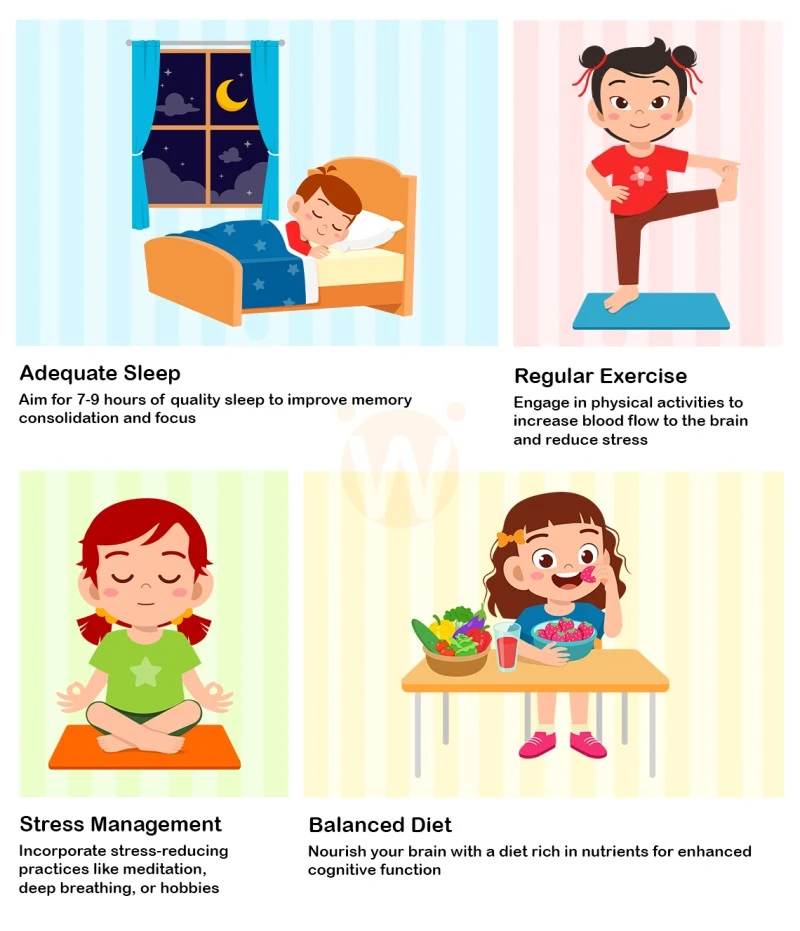
For more insights into managing stress and its impact on your life, explore our article on the emotional impact of stress.
Common Pitfalls to Avoid
Being aware of common study pitfalls can help you avoid them and study more effectively. Here are some to keep in mind:
- Procrastination and Cramming: Delaying study sessions and then trying to learn everything at once is less effective than regular, spaced-out study sessions. Cramming can lead to a superficial understanding of the material and is more stressful.
- Multitasking: While it might seem efficient, multitasking can actually reduce your focus and the quality of your learning. Dedicate your study time solely to studying and avoid distractions such as social media or TV.
- Not Seeking Help When Needed: If you’re struggling with a concept, don’t hesitate to ask for help. Speak with your teacher, tutor, or classmates. Remember, seeking help is a sign of strength, not weakness.
Common Study Pitfalls and Solutions
| Common Study Pitfalls | Solutions and Counteractions |
|---|---|
| Procrastination: Delaying study sessions and putting off assignments until the last minute. | Set Specific Goals and Deadlines: Break down your tasks into smaller, manageable goals with specific deadlines. Use a planner or digital reminders to keep track. |
| Cramming: Trying to learn all material in a very short period before an exam. | Regular Study Sessions: Spread out your study sessions over a longer period. Aim for shorter, more frequent study periods rather than long, infrequent ones. |
| Multitasking During Study Sessions: Trying to do multiple tasks at once, leading to reduced focus and retention. | Focused Study Time: Dedicate specific times to study without distractions. Turn off unnecessary electronics and social media notifications. |
| Over-Reliance on Passive Reading: Relying solely on reading textbooks without engaging with the material. | Active Learning Techniques: Engage with the material through summarization, teaching others, or applying concepts to practical examples. |
| Skipping Breaks: Studying for long periods without taking breaks, leading to decreased concentration and burnout. | Scheduled Breaks: Implement the Pomodoro Technique or similar methods, where you study for a set period (like 25 minutes) and then take a short break (5 minutes). |
| Not Reviewing Material Regularly: Failing to revisit past topics, leading to poor retention. | Consistent Review: Schedule regular review sessions for past materials. Use flashcards or practice tests to revisit and reinforce learning. |
| Ignoring Mental and Physical Health: Neglecting self-care which can affect cognitive abilities and motivation. | Holistic Self-Care Approach: Prioritize sleep, nutrition, exercise, and stress management techniques as part of your study routine. |
| Not Seeking Help When Needed: Struggling alone with difficult concepts or coursework. | Utilize Available Resources: Reach out to instructors, tutors, or study groups for help. Don’t hesitate to use academic resources provided by your institution. |
By taking care of yourself and being mindful of these common pitfalls, you can enhance both your academic performance and overall well-being. The key is to study smarter, not just harder, and to remember that your health is just as important as your grades.
If test anxiety is one of your challenges, find helpful strategies here.
Practice and Review
Mastering any subject isn’t just about reading through the material once. It requires regular practice and review. Here’s how you can make these strategies work for you:
- Regular Review: Frequent revisiting of material helps move information from short-term to long-term memory. Schedule weekly or bi-weekly review sessions to go over past materials, ensuring a deeper understanding and better retention.
- Practice Tests: Simulating exam conditions with practice tests can prepare you for the real thing. It helps identify areas where you need more focus and reinforces your learning. Use past papers, online quizzes, or create your own tests.
- Teaching Others: Explaining concepts to someone else is a powerful way to reinforce your own understanding. It requires you to think more critically and clarify your thoughts, which can lead to better retention.
- Desirable Difficulties: Introduced by psychologist Robert A. Bjork, this concept suggests that making learning slightly challenging can significantly improve long-term retention. Techniques like mixing up different types of problems or studying multiple subjects in one session can create these beneficial challenges.
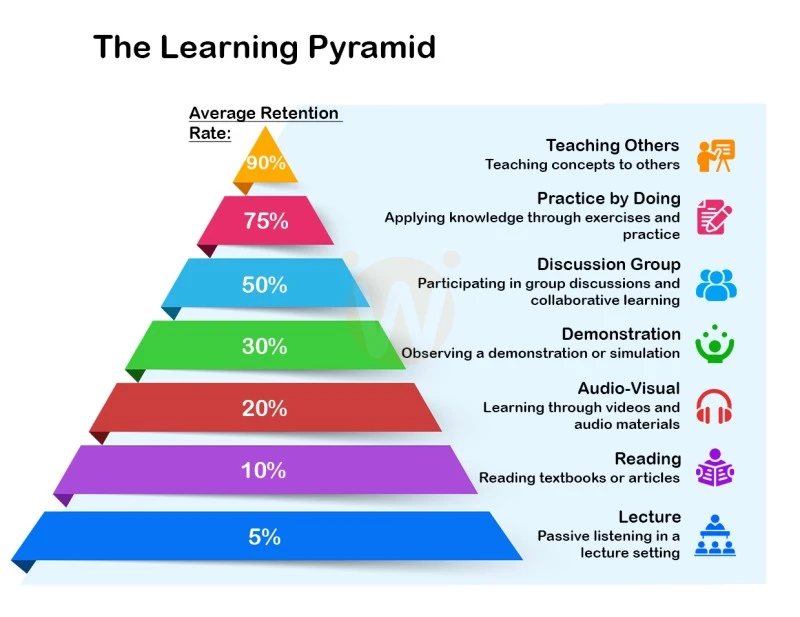
Enhance your learning further by exploring different test-taking strategies for students.
Adapting and Evolving Your Study Habits
As you progress in your academic journey, your study habits should evolve too. Here’s how you can continually adapt and refine your approach:
- Be Open to Change: What worked for you last semester might not be as effective now. Be open to experimenting with new methods and adjusting your strategies.
- Continuous Improvement: Always look for ways to improve. This could mean tweaking your schedule, trying different study techniques, or seeking feedback from peers and instructors on how you can enhance your learning.
- Self-Assessment: Regularly assess your study habits. Are they helping you achieve your academic goals? Do you feel stressed or well-balanced? Reflection can help you identify areas for improvement.
- Stay Informed: Keep up with the latest study techniques and tools. Education is an ever-evolving field, and staying informed can provide you with new, innovative ways to learn.
- Flexible Mindset: Understand that learning is a journey with ups and downs. Be flexible and kind to yourself, and recognize that developing effective study habits is a process that takes time.
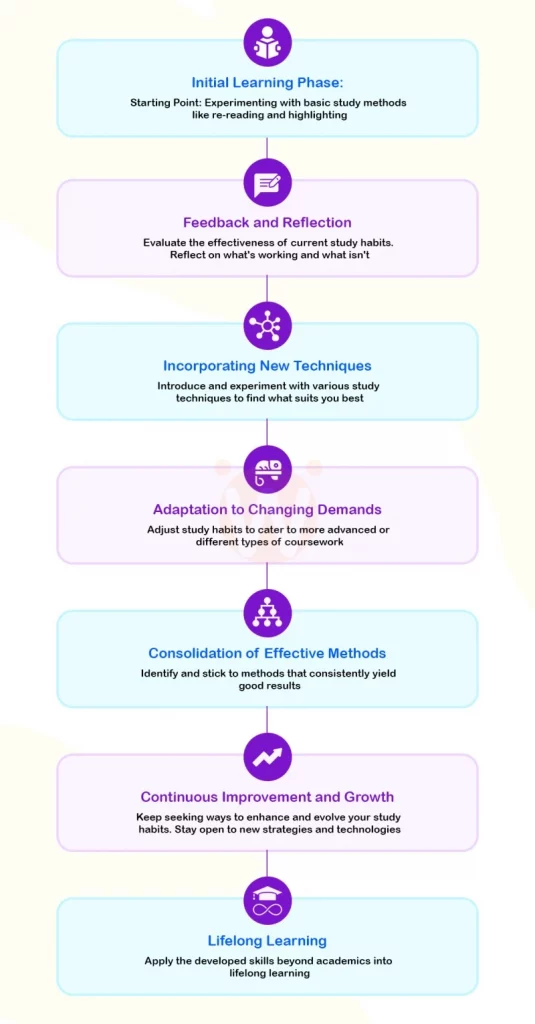
By continually adapting and evolving your study habits, you can ensure that your learning process remains effective, efficient, and aligned with your changing academic needs and goals. Remember, the goal is not just to learn but to learn how to learn.
For a broader perspective on personal growth and adaptability, check out our insights on the effect of love and compassion in our life.
Conclusion
Throughout this article, we’ve explored a range of strategies and tips designed to enhance your study habits. From creating a structured study plan to understanding the power of group study and peer support, we’ve covered the essentials of effective learning. We’ve delved into the importance of taking care of yourself through proper sleep, nutrition, and stress management, and addressed common pitfalls like procrastination and multitasking. The significance of regular practice and review, as well as the need to adapt and evolve your study habits, have been highlighted to ensure that your approach to studying remains dynamic and effective.
Now, it’s time to take these insights and apply them to your academic journey. Start small – you don’t need to overhaul your entire routine overnight. Gradually incorporate these habits into your daily schedule, and observe the positive changes in your study efficiency and academic performance. Remember, developing effective study habits is a continuous process that is key not only to academic success but to lifelong learning.
We encourage you to implement these tips in your study routine and share your experiences. Observing what works for you and what doesn’t can be incredibly insightful for both you and your peers. If you require additional resources or academic support, don’t hesitate to reach out for guidance.
If you find yourself needing assistance in optimizing your study habits or managing academic stress, consider exploring the online counselling services offered by Wellness Hub. For more personalized guidance and to take the next step in enhancing your academic performance, seek out these resources. Your journey towards effective studying and academic excellence is a path worth pursuing with dedication and the right support.
As you embark on this journey of academic excellence, remember that seeking help is a strength. Our experts are here to guide you in various aspects, from relationship counseling to overcoming test anxiety.
Frequently Asked Questions
What Are the Best Techniques for Effective Studying?
Effective techniques include using flashcards, creating mind maps, summarizing material in your own words, and practicing active learning over passive reading. Experiment with different methods to find what works best for you.
How Often Should I Review My Study Material?
Regular review is key to retention. Aim for weekly or bi-weekly review sessions to reinforce what you’ve learned and keep the material fresh in your mind.
Can Group Study Be More Effective Than Studying Alone?
Group study can be effective as it allows for discussion, explanation, and collaboration, which can aid in understanding and retaining information. However, it’s important to ensure the group remains focused on studying.
How Can I Balance Studying with Other Life Commitments?
Create a realistic study plan that includes time for work, hobbies, and relaxation. Remember that taking care of your mental and physical health is as important as your academic goals.
What Should I Do If I’m Struggling with a Subject?
If you’re struggling, don’t hesitate to seek help. Ask your teacher, tutor, or classmates for assistance. Utilizing academic support services at your school or online resources can also be beneficial.
Is It Better to Study at Night or In the Morning?
The best time to study depends on your personal preference and when you feel most alert and focused. Some people find they concentrate better in the morning, while others prefer studying at night.
How Important Is Sleep for Effective Studying?
Sleep is crucial for memory consolidation and cognitive function. Ensure you get 7-9 hours of quality sleep each night to optimize your studying effectiveness.
What Are Some Common Pitfalls in Studying I Should Avoid?
Common pitfalls include procrastination, cramming, multitasking during study sessions, and not seeking help when needed. Be aware of these and actively work to avoid them.
How Can I Use Technology to Enhance My Studying?
Technology offers many tools to aid studying, such as educational apps, online courses, and virtual flashcards. Use these resources to complement traditional study methods.
How Can I Stay Motivated to Study Regularly?
Set clear, achievable goals, reward yourself for meeting them, and maintain a balanced study-life routine. Regularly remind yourself of your long-term academic and career goals to stay motivated.
About the Author:
Prapoorna Mangalampalli, Psychologist
Prapoorna, an author with dual master’s degrees in Psychology and English, excels in exploring and enhancing human experiences. Her writing, characterized by deep empathy and insight, primarily focuses on the complexities of counseling, spanning areas such as online, marital, relationship, child, family, and career counseling. Specialized training in various counseling sectors underscores her dedication to positive change. In her blogs, Prapoorna offers valuable guidance and a unique perspective for parents of children with Autism and special needs, creating a supportive community in this realm.
Book your Free Consultation Today
Parent/Caregiver Info:
Client’s Details:
* Error Message








